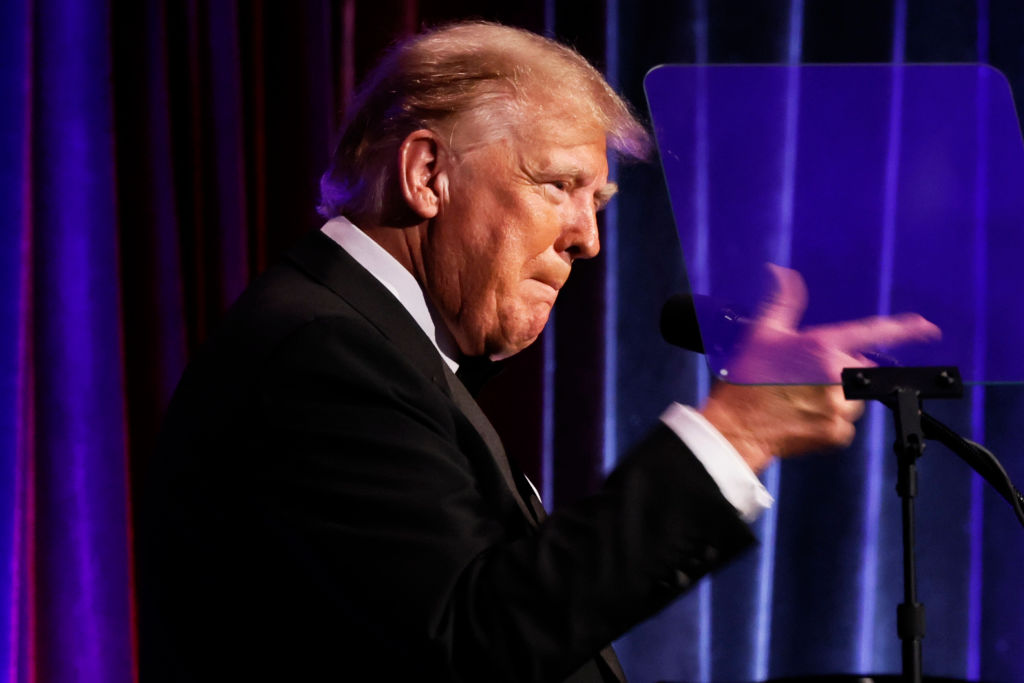
On Friday, an appeals court upheld a gag order against Donald Trump, narrowing its scope, but largely affirming the restrictions imposed by the trial court in the federal election interference case. The court’s order blunts Trump’s efforts to use his presidential campaign as carte blanche for threats and disinformation.
In its 68-page opinion, the D.C. Circuit Court of Appeals rejected Trump’s arguments that the limited gag order imposed by Judge Tanya S. Chutkan violated his First Amendment rights to free speech. The trial court had prohibited both parties from making statements that “target” witnesses, parties or court staff. Chutkan’s order permitted statements regarding the Biden Administration, the Justice Department, the prosecution of the case, and herself.
The appeals court called out Trump’s effort to frame his case as a prohibited prior restraint on free speech, noting that participants in court cases are subject to different rules than the public at large. “Like any other criminal defendant,” the court wrote, “Mr. Trump does not have an unlimited right to speak.” Restrictions are permissible when they are narrowly tailored to achieve a compelling interest. Here, the court found the gag order necessary to ensure the court’s duty to ensure the fair administration of justice. A political campaign, the court said, does not change that obligation. The court modified the order to prohibit only statements about witnesses regarding their participation in the case. And it bars only statements about prosecution members, court staff or their family members only when made with intent to materially interfere with the case. Jack Smith himself remains fair game.
The gag order in this case, as well as one in a New York state court case, came in the response to Trump’s persistent attacks on his legal adversaries with the same disinformation tactics he used to incite public anger on Jan. 6, 2021. As a defendant in four criminal cases and a civil fraud trial, Trump continues to call the cases against him “witch hunts” and “rigged,” and targets prosecutors and judges personally with terms such as “deranged” and “thugs,” even accusing them of election interference. Trump’s incendiary attacks are more than mere denials of the charges. They can be read as invitations for violence. Before he was charged with false statements in Manhattan, Trump warned that “death and destruction” could follow. In August, Trump posted on his Truth Social platform, “IF YOU GO AFTER ME, I AM COMING AFTER YOU.”
Another appeal is currently pending over a gag order imposed in a New York state court. There, Judge Arthur Engoron ordered Trump to refrain from speaking about court staff after Trump had posted disinformation online about the judge’s clerk. Judge Engoron fined Trump twice for violating his order. Trump has also posted false information about the judge’s wife, claiming that she was responsible for content online disparaging of Trump.
While the First Amendment protects free speech, no right is absolute. In Sheppard v. Maxwell, the 1966 case that inspired the television show The Fugitive, the Supreme Court held that courts must balance First Amendment rights with the fair administration of justice. Courts often restrict the constitutional rights of defendants as needed. For example, in cases alleging violence or illegal use of firearms, courts may prohibit the defendant from possessing guns as a condition of their release without violating the Second Amendment. Similarly, courts routinely direct defendants to have no contact with the victims of their alleged crimes while their case is ongoing, despite the tension with their First Amendment right to free assembly. In the same way, courts may impose gag orders on parties in pending cases without violating their First Amendment right to free speech so long as they are no broader than necessary.
It is not just the defendant who is entitled to a fair trial—the government and the public have that right, too. One risk of a party’s unfettered commentary is that the jury pool will be unfairly tainted by content they encounter in the media, which is not governed by the rules of evidence, such as prohibitions on hearsay.
Trump’s unfettered words also place the safety of witnesses at risk. Fear of threats or harassment could have a chilling effect on their testimony in the short term. Even worse, Trump’s attacks could incite his followers to harm witnesses, prosecutors, or court staff. We’re already seeing it: a 275-page court filing in the New York civil case reported a “deluge” of messages on the court’s phone and the law clerk’s personal cell phone, emails, and social media accounts with hundreds of threatening, harassing, disparaging, and antisemitic messages. And that’s in a civil case. As Trump’s criminal cases come to trial in the coming year, civil unrest among his supporters is a very real threat.
The First Amendment protects the fundamental right of free speech, but like all rights, it must yield where necessary to achieve a compelling interest. As the Supreme Court has said, the Constitution is not a suicide pact.
More Must-Reads from TIME
- How Donald Trump Won
- The Best Inventions of 2024
- Why Sleep Is the Key to Living Longer
- Robert Zemeckis Just Wants to Move You
- How to Break 8 Toxic Communication Habits
- Nicola Coughlan Bet on Herself—And Won
- Why Vinegar Is So Good for You
- Meet TIME's Newest Class of Next Generation Leaders
Contact us at letters@time.com